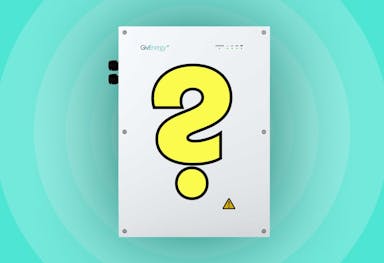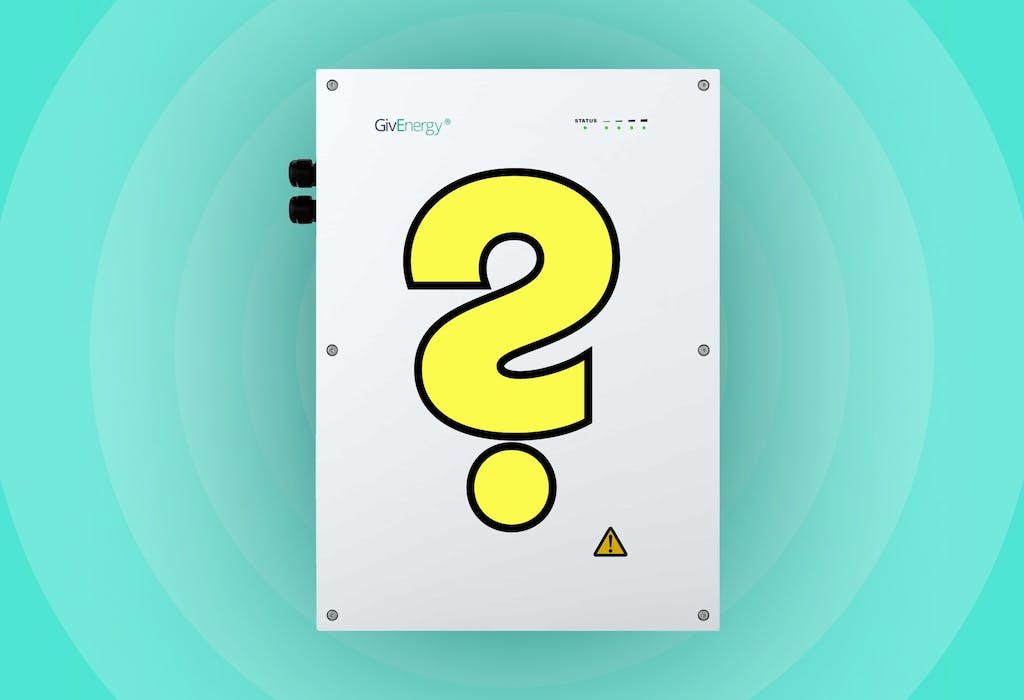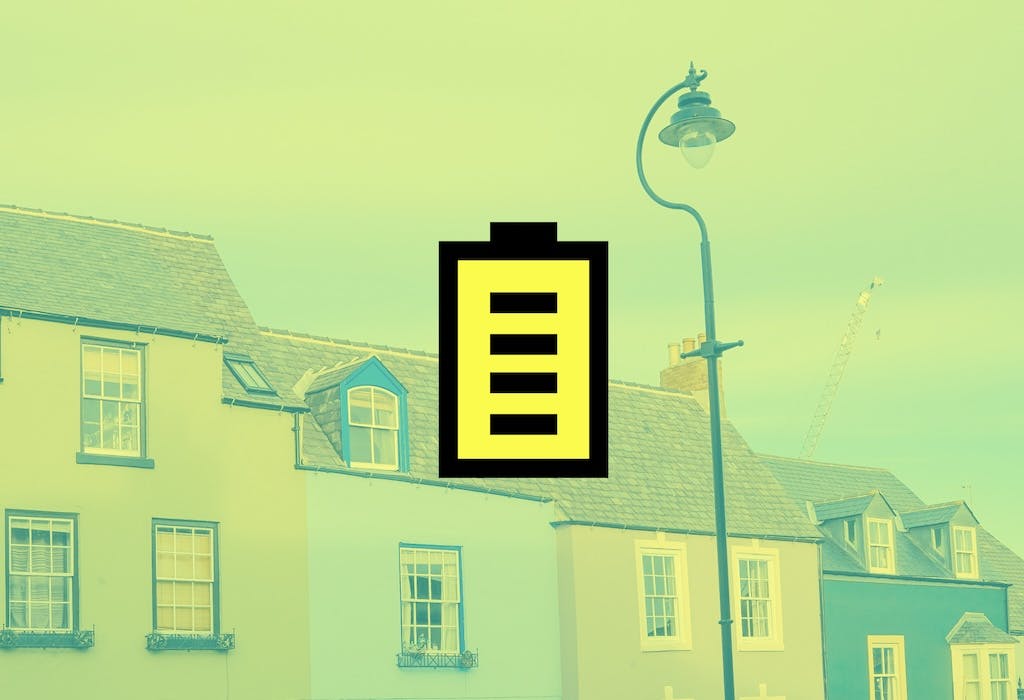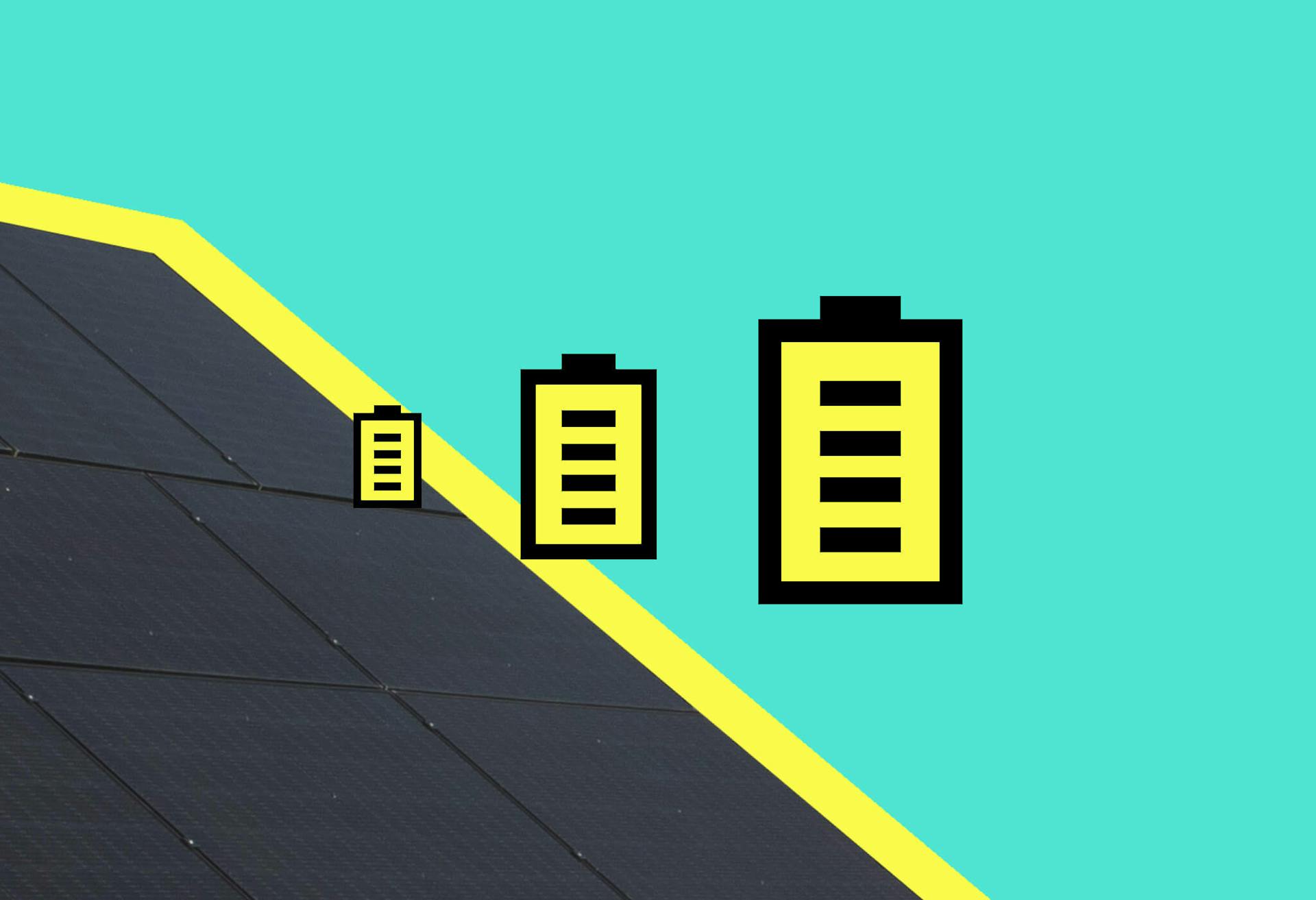- Solar advice hub
- Batteries
- How much does a solar battery cost in the UK?
How much does a solar battery cost in the UK?
Here's how much solar batteries cost, what affects the price, and whether they're worth the investment.


Why you can trust our content
We know that the solar industry is full of misinformation, but we only use reliable sources, including:
- Our experienced solar experts, installers and system designers
- Our own database of solar & battery system designs
- Authoritative bodies like MCS and the UK government



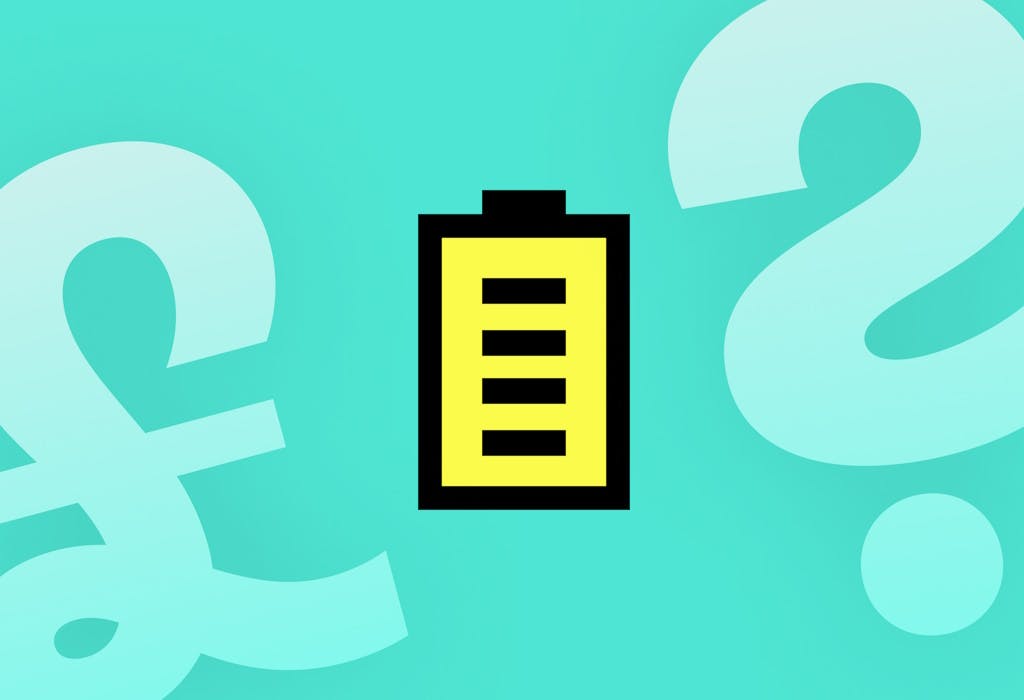
Calculate savings
What kind of home do you live in?
Calculate savings
What kind of home do you live in?
Solar battery costs: at a glance
A solar battery is one of the best ways to get the most out of your solar panel system – but before you commit, you’ll want to see how much it costs and saves you.
After all, you only want to buy an extra piece of solar gear for your home if it can help you cut your electricity bills even further.
Thankfully, it can – which is why around 94% of UK solar panel installations between June 2024 and May 2025 included a battery, according to data from Flexi-Orb and EPVS. It's now a crucial part of any solar setup.
In this guide, we’ll explain how much different sizes of solar battery cost, which factors affect the price, and whether a solar battery is worth the investment.
If you’re wondering how much a solar & battery system could save you, just answer a few quick questions below and we'll provide an estimate.
Find out how much you can save
What kind of home do you live in?
What’s the average cost of a solar battery?
| Annual electricity usage | Battery size | Average cost if installed with solar panels |
|---|---|---|
| Up to 5,000kWh | 5kWh | £3,000-4,000 |
| 5,000-8,000kWh | 10kWh | £4,000-6,000 |
| 8,000kWh+ | 15kWh | £5,000-7,000 |
The average cost of a 5kWh solar battery is £3,000-£4,000, if you include it within a solar panel system installation.
A 5kWh battery is suitable for the majority of homes in the UK, as the average annual electricity consumption is 3,400kWh.
You can get this relatively low price – and the others shown in the table above – if you’re already paying for the labour and an inverter.
However, if you add a 5kWh battery to the system at a later date, it'll typically be more expensive, as you'll have to pay for the labour and inverter all over again.
This is also true of other battery sizes. A 10kWh battery costs around £4,000-£6,000 as part of a wider system installation, but more than that on its own.
As usual, you’re better off making all your planned changes to your home at once – otherwise you’ll end up paying more than you need to.
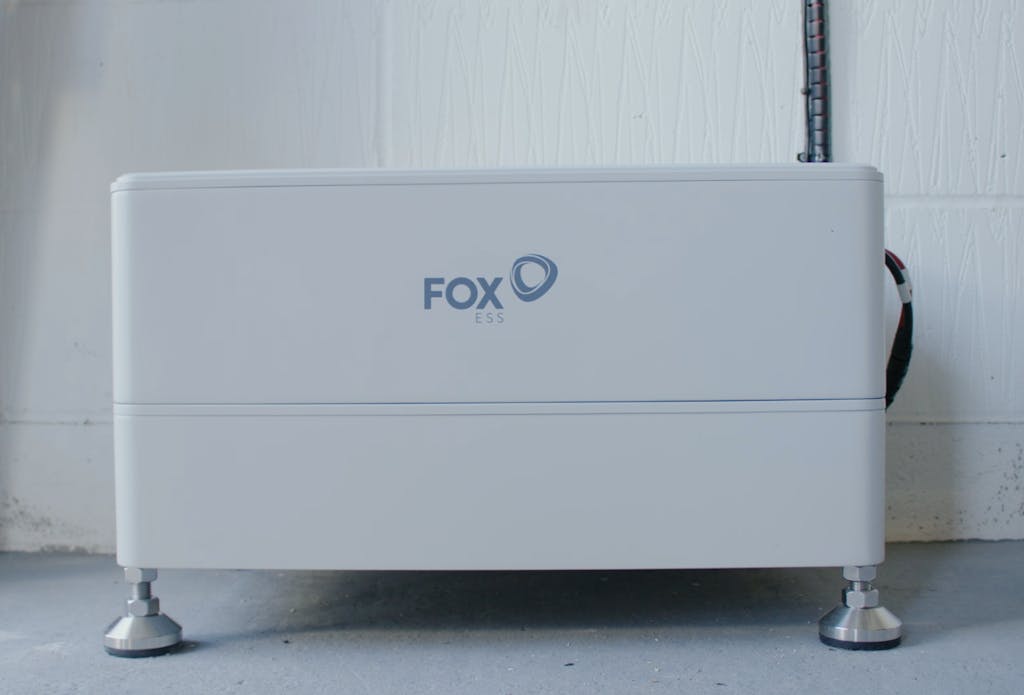
Do you have to pay VAT on solar batteries?
You don’t have to pay any VAT on solar batteries.
In February 2024, the government added standalone solar batteries to its list of energy-saving materials that qualify for a 0% VAT rate until the end of March 2027.
After that point, the government plans to raise this rate to 5% for all solar installations.
Previously, most households had to pay 20% VAT to purchase a solar battery on its own, though some homes with elderly residents or benefit recipients qualified for a 5% rate.
As well as solar panels and batteries, you also don’t have to pay VAT on renewable systems including air and ground source heat pumps, water turbines, micro combined heat and power units, and wind turbines.
This table shows the cost of buying a battery with solar panels, rather than as a standalone installation. You can see the current price, plus how much it will cost after March 2027, with a 5% VAT rate.
| Battery size | Average cost if installed with solar panels | Average cost with 5% VAT rate |
|---|---|---|
| 5kWh | £3,000-4,000 | £3,150-4,200 |
| 10kWh | £4,000-6,000 | £4,200-6,300 |
| 15kWh | £5,000-7,000 | £5,250-7,350 |
Are there any grants available for solar batteries?
| Grant | Who’s eligible? | When does it end? |
|---|---|---|
| Warm Homes: Local Grant | Energy-inefficient households that are deprived, low-income, or receive a means-tested benefit | 31 March 2028 |
| Warm Homes: Social Housing Fund | Any local authorities, providers, and charities that own social housing | 30 September 2028 |
| Welsh Government Warm Homes Programme | Energy-inefficient households in Wales which receive a means-tested benefit or are low-income | April 2031 |
| VAT discount | All households, no specific conditions | 31 March 2027 |
There are multiple grants and schemes that can help you get money off your solar battery – though since they're targeted at the most deprived and energy-inefficient households, they exclude most people.
Here are the main ways to get a solar battery grant:
Unfortunately, the Home Energy Scotland Grant and Loan scheme's solar provision ended in June 2024. The Scottish government initiative previously offered a £1,250 grant and £4,750 interest-free loan for solar batteries.
If you want to avoid the high upfront cost of solar panels, it’s worth finding out whether Sunsave Plus will work for you. To sign up for the UK's first solar subscription, click below, enter a few details, and we'll be in touch.
Find out how much you can save
What kind of home do you live in?
Solar battery grant: eligibility calculator
We've built a calculator that tells you if you’re likely to qualify for a solar panel grant, and which one would probably suit you best.
And if we think you may be eligible for the Warm Homes: Local Grant, Warm Homes: Social Housing Fund, Warm Homes Programme, or ECO4, this means you might be able to get a battery. If you get any other result, it’ll just be a grant for solar panels (without a battery).
And whatever outcome you get, you can still access the 0% VAT rate until March 2027.
What factors affect the cost of a solar battery?
There are five key factors that affect the cost of a solar battery.
You’ll usually pay a higher price for a more technologically advanced battery, and a bigger battery also costs more than a smaller model.
If you choose certain manufacturers or installers over others, you can also save money – or potentially pay more for a better result.
The key factors are:
- Battery size
- Battery quality
- Whether it’s installed with solar panels
- The battery’s manufacturer and installer
- Whether it offers Emergency Power Supply
1. Battery size
The bigger the battery, the higher its price, as a rule.
For instance, you’ll almost always pay more to buy a 10kWh battery than a 5kWh version.
It’s therefore worth taking the time to assess your solar generation and electricity consumption, to make sure your battery fits your needs.
If you want to learn more, read our guide: what size solar battery do you need?
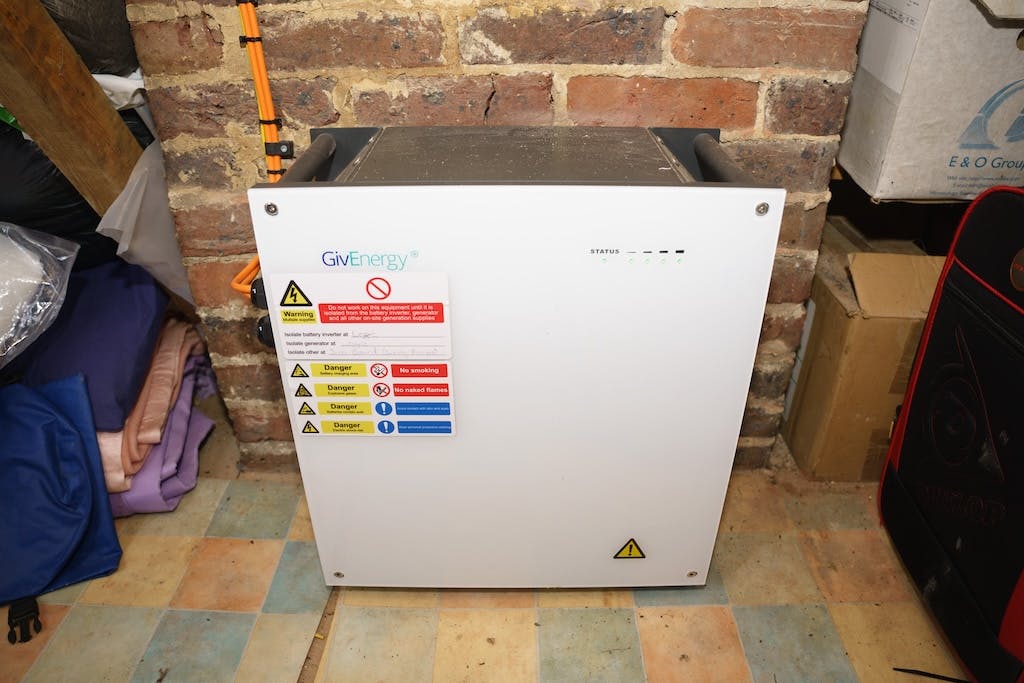
2. Battery quality
As with most products, the quality of your solar battery will go a long way to determining its price.
Make sure you check your battery’s depth of discharge (DoD), as this will tell you how much of its kWh size you’re able to use without degrading the battery in the long run. This may also be referred to as its ‘usable capacity’.
A battery with 100% DoD, meaning you’re able to use its entire capacity, will usually be worth more than a model with 80% DoD, all other things being equal.
The battery’s rate of discharge also affects its price. If it’s high, you’ll be able to use smart battery controls and the best export tariffs more effectively, which should help you to save more on your electricity bills, but will likely cost more upfront.
Consider a battery’s efficiency rate as well, as this shows how much electricity is retained during the transfer from your panels to your battery.
Lithium-ion batteries are usually around 96% efficient, so a higher rate will likely result in a steeper price. Look through a battery’s datasheet to find these statistics, or ask an installer.
It’s usually worth choosing a high-quality model, especially as it’s relatively affordable now, with lithium-ion battery costs having plummeted by 90% over the past 15 years, according to a 2024 report from the International Energy Agency.
For more information, read our guide to the different types of solar battery.
The falling cost of lithium-ion battery cells, 2014-2024
3. Whether it’s installed with solar panels
The price of installing a solar battery tends to fall if it’s installed at the same time as solar panels.
The price of the inverter is already folded into the total amount of a solar panel system installation, and adding a battery doesn’t involve much additional labour cost either.
This is why it’s also better to add all your solar panels to your system at once, rather than leaving some for later to try to spread out the cost – as it’ll have the opposite effect.
For more information, check out our article about solar panel costs.
4. The battery’s manufacturer and installer
A battery’s price can be affected by the brand name it’s attached to, with some companies charging more to position themselves as prestigious, or because they’re genuinely more trusted or highly regarded than others.
The manufacturer’s policies may also affect the price of a battery. A longer warranty may make your purchase more expensive, for instance – though a shorter one may lead to higher overall costs in the long run.
And the way your installer prices their services will impact the cost too, depending on factors including your location, the complexity of the project, and how many engineers are required.
5. Whether it offers Emergency Power Supply
Emergency Power Supply (EPS) is a function included in some solar batteries that can keep your home's lights on during a power cut.
But even if you buy one of the few battery models that comes with EPS, you'll need to get your solar installer or an electrician to set up and activate this feature.
The process involves adding an automatic or manual relay, a consumer unit, and a new socket, all of which makes your installation longer, more expensive, and more complex.
Fortunately, EPS isn't usually necessary in the UK, because the average home is rarely affected by power cuts, if at all.
The average household goes through 0.4 outages per year, and loses electricity for around 35 minutes in total, according to the latest Ofgem report.
For more information, read our guide to EPS for solar.
What’s the cheapest type of solar battery?
The cheapest type of solar battery that’s widely available is the lead-acid battery.
These batteries, which you can see in most cars, typically last three to seven years – or less, if you don’t keep up with their numerous maintenance needs.
Lithium-ion batteries are usually more expensive but have a higher average lifespan, at 10-12 years, and very few maintenance needs.
It’s worth choosing a high-quality lithium-ion battery if you want to make the most of your investment in a solar panel system to save the most money and carbon emissions.
Ultimately, it’s no good generating enough electricity to save hundreds of pounds per year if your battery isn’t able to hold onto the energy effectively – and if you need to replace it every few years.
With a more upmarket model, you can use smart battery controls to make the most of your smart export tariff and save the most money possible each year.
If you would like to see the savings you could get from a solar & battery system, answer a few quick questions below and we’ll provide an estimate.
Find out how much you can save
What kind of home do you live in?
Solar battery maintenance costs
Lithium-ion solar batteries need replacing every 10-12 years, but don’t need much maintenance during their useful life, as long as you follow the manufacturer’s instructions.
This may include limiting the maximum number of daily cycles, and not running them down below their stated depth of discharge. Ignoring either of these requirements will degrade your battery faster, meaning you’ll have to replace it sooner.
So if you’d like to help your battery’s health and potentially extend its lifespan, you could get an engineer to come round once per year to tell you how well you’re taking care of your battery.
This will cost around £100, with the actual price depending largely on your location.
Batteries don’t usually break down irretrievably, but with a lifespan of 10-12 years, they’re not a particularly long-term investment anyway – unlike solar panels, which last around 30-40 years.
That’s why Sunsave Plus is such an excellent choice: we'll provide you with a free out-of-warranty replacement battery.
This is included in the Sunsave Guarantee, which also provides a free out-of-warranty replacement inverter and downtime protection – meaning you can get reimbursed if your panels underperform for an extended period of time.
And your system will be insured by Aviva against damage, fire, and theft.
Are solar batteries worth the cost?
Solar batteries are absolutely worth the cost.
They can help you to combat the main issue with solar panels – that they can’t generate electricity at night – by storing electricity for as long as you need.
This will enable you to use more of the electricity that your panels produce, which will cut your bills even further.
A solar battery also allows you to access some of the best export tariffs, which can help increase your savings substantially.
And if you add a battery onto your initial solar panel system installation, it usually won’t cost that much extra – making it excellent value for money.
Here are the main advantages:
- You can save much more on your electricity bills with a battery
- A battery costs significantly less if it’s installed at the same time as your solar panels
- You can gain access to the best export tariffs on the market
- Using more of your solar electricity will lessen the impact of energy price rises
- A battery can help you to reduce your carbon footprint
If you’re wondering how much a solar & battery system could save you, just answer a few quick questions below and we’ll provide you with an estimate.
Find out how much you can save
What kind of home do you live in?
Solar battery costs: FAQs
Related articles

Written byJosh Jackman
Josh has written about the rapid rise of home solar for the past six years. His data-driven work has been featured in United Nations and World Health Organisation documents, as well as publications including The Eco Experts, Financial Times, The Independent, The Telegraph, The Times, and The Sun. Josh has also been interviewed as a renewables expert on BBC One’s Rip-Off Britain, ITV1’s Tonight show, and BBC Radio 4 and 5.


